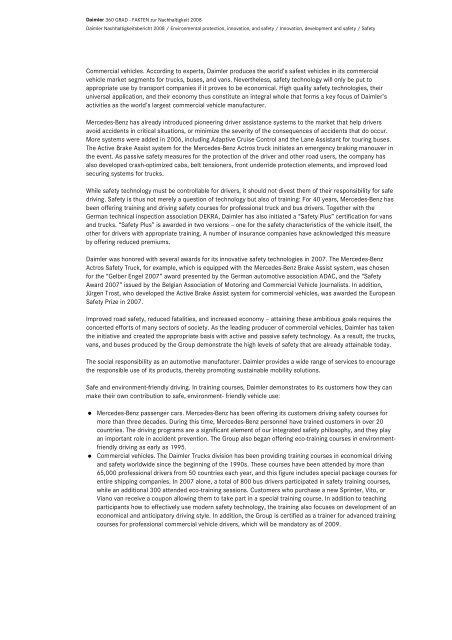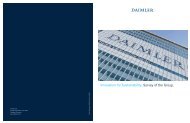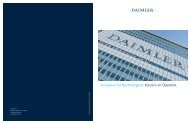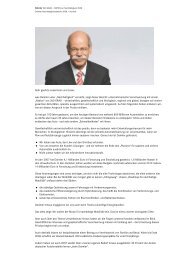Dear readers, This report describes what Daimler means by ...
Dear readers, This report describes what Daimler means by ...
Dear readers, This report describes what Daimler means by ...
You also want an ePaper? Increase the reach of your titles
YUMPU automatically turns print PDFs into web optimized ePapers that Google loves.
<strong>Daimler</strong> 360 GRAD - FAKTEN zur Nachhaltigkeit 2008<br />
<strong>Daimler</strong> Nachhaltigkeitsbericht 2008 / Environmental protection, innovation, and safety / Innovation, development and safety / Safety<br />
Commercial vehicles. According to experts, <strong>Daimler</strong> produces the world’s safest vehicles in its commercial<br />
vehicle market segments for trucks, buses, and vans. Nevertheless, safety technology will only be put to<br />
appropriate use <strong>by</strong> transport companies if it proves to be economical. High quality safety technologies, their<br />
universal application, and their economy thus constitute an integral whole that forms a key focus of <strong>Daimler</strong>’s<br />
activities as the world’s largest commercial vehicle manufacturer.<br />
Mercedes-Benz has already introduced pioneering driver assistance systems to the market that help drivers<br />
avoid accidents in critical situations, or minimize the severity of the consequences of accidents that do occur.<br />
More systems were added in 2006, including Adaptive Cruise Control and the Lane Assistant for touring buses.<br />
The Active Brake Assist system for the Mercedes-Benz Actros truck initiates an emergency braking manouver in<br />
the event. As passive safety measures for the protection of the driver and other road users, the company has<br />
also developed crash-optimized cabs, belt tensioners, front underride protection elements, and improved load<br />
securing systems for trucks.<br />
While safety technology must be controllable for drivers, it should not divest them of their responsibility for safe<br />
driving. Safety is thus not merely a question of technology but also of training: For 40 years, Mercedes-Benz has<br />
been offering training and driving safety courses for professional truck and bus drivers. Together with the<br />
German technical inspection association DEKRA, <strong>Daimler</strong> has also initiated a “Safety Plus” certification for vans<br />
and trucks. “Safety Plus” is awarded in two versions – one for the safety characteristics of the vehicle itself, the<br />
other for drivers with appropriate training. A number of insurance companies have acknowledged this measure<br />
<strong>by</strong> offering reduced premiums.<br />
<strong>Daimler</strong> was honored with several awards for its innovative safety technologies in 2007. The Mercedes-Benz<br />
Actros Safety Truck, for example, which is equipped with the Mercedes-Benz Brake Assist system, was chosen<br />
for the “Gelber Engel 2007” award presented <strong>by</strong> the German automotive association ADAC, and the “Safety<br />
Award 2007” issued <strong>by</strong> the Belgian Association of Motoring and Commercial Vehicle Journalists. In addition,<br />
Jürgen Trost, who developed the Active Brake Assist system for commercial vehicles, was awarded the European<br />
Safety Prize in 2007.<br />
Improved road safety, reduced fatalities, and increased economy – attaining these ambitious goals requires the<br />
concerted efforts of many sectors of society. As the leading producer of commercial vehicles, <strong>Daimler</strong> has taken<br />
the initiative and created the appropriate basis with active and passive safety technology. As a result, the trucks,<br />
vans, and buses produced <strong>by</strong> the Group demonstrate the high levels of safety that are already attainable today.<br />
The social responsibility as an automotive manufacturer. <strong>Daimler</strong> provides a wide range of services to encourage<br />
the responsible use of its products, there<strong>by</strong> promoting sustainable mobility solutions.<br />
Safe and environment-friendly driving. In training courses, <strong>Daimler</strong> demonstrates to its customers how they can<br />
make their own contribution to safe, environment- friendly vehicle use:<br />
� Mercedes-Benz passenger cars. Mercedes-Benz has been offering its customers driving safety courses for<br />
more than three decades. During this time, Mercedes-Benz personnel have trained customers in over 20<br />
countries. The driving programs are a significant element of our integrated safety philosophy, and they play<br />
an important role in accident prevention. The Group also began offering eco-training courses in environmentfriendly<br />
driving as early as 1995.<br />
� Commercial vehicles. The <strong>Daimler</strong> Trucks division has been providing training courses in economical driving<br />
and safety worldwide since the beginning of the 1990s. These courses have been attended <strong>by</strong> more than<br />
65,000 professional drivers from 50 countries each year, and this figure includes special package courses for<br />
entire shipping companies. In 2007 alone, a total of 800 bus drivers participated in safety training courses,<br />
while an additional 300 attended eco-training sessions. Customers who purchase a new Sprinter, Vito, or<br />
Viano van receive a coupon allowing them to take part in a special training course. In addition to teaching<br />
participants how to effectively use modern safety technology, the training also focuses on development of an<br />
economical and anticipatory driving style. In addition, the Group is certified as a trainer for advanced training<br />
courses for professional commercial vehicle drivers, which will be mandatory as of 2009.














